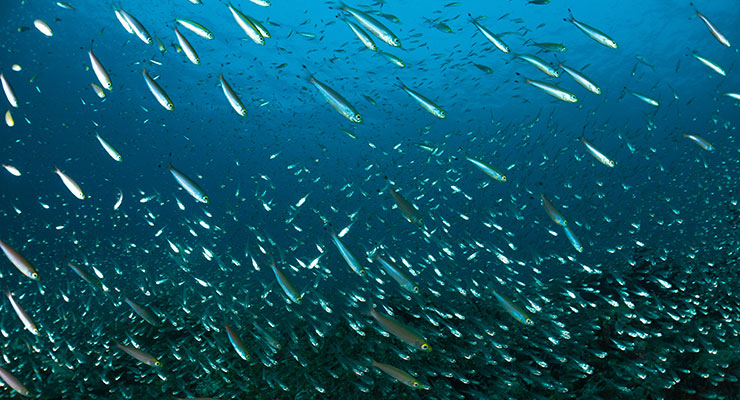By Mike Montemarano, Associate Editor10.03.22
Sourcing raw materials from marine ecosystems can present significant challenges, especially as unsustainable, industrial-scale fishing accelerates climate change and biodiversity loss.
For example, roughly 100 million pounds of plastic pollution enters the ocean each year due to lost fishing gear, according to a 2021 report published in Fish and Fisheries. Researchers have estimated that 46% of the Great Pacific Garbage Patch—a collection of marine debris in the North Pacific Ocean spread over a roughly 1.6 million square kilometer area—is comprised of lost fishing gear.
Stakeholders in the omega-3 fatty acids industry are challenged to develop, pursue, and progress environmental, social, and governance (ESG) plans.
“GOED added sustainability to our strategic pillars of focus in 2020 after repeated requests from members for over a decade,” said Chris Gearheart, director of growth and engagement at GOED. “As an association, we are committed to enhancing not just the environmental impacts of raw material harvesters but also the social- and governance-related impacts of the entire EPA and DHA omega-3 value chain. We’ve been working on this pillar for two years. Given the complexity of the topic and many stakeholders to consider, we are still studying the best way to help our members without duplicating the efforts of other organizations.”
After surveying over 160 member companies in total about ESG activity and recommendations for GOED, most companies suggested the organization focus on training and resources for members.
“Accordingly, we formed a sustainability committee as a non-deliberative educational forum for member companies to start their ESG journeys or support other companies on their way,” Gearheart said. The committee’s inaugural conference in September featured a presentation on how individual companies can evaluate their ESG impact against the UN’s SDGs. “GOED will use SDGs as a vocabulary to coordinate improved sustainability across dozens of geographies and activities that keep our members in business.”
Along with building on the work of monitoring and certification agencies, GOED will support emerging technologies that can find new sources for EPA and DHA outside of fishing.
“EPA and DHA are crucial for human health, and it’s a stark truth that if every consumer on Earth demanded even the most conservative daily recommended amount, the oceans couldn’t supply it,” Gearheart said. “That’s why GOED fully supports all companies developing algal omega-3s, omega-3s from genetically modified oilseeds, and other scalable ways to produce these nutrients without adversely affecting marine resources, especially as the science behind EPA and DHA omega-3 continues to support their many benefits and as demand grows. This pioneering work will build on the careful work of certifiers like the Marine Stewardship Council (MSC) and national or provincial regulators like Peru’s Instituto del Mar (IMARPE) and the Alaska Department of Fish and Game that have carefully monitored and preserved crucial omega-3 fisheries for decades.”
For example, roughly 100 million pounds of plastic pollution enters the ocean each year due to lost fishing gear, according to a 2021 report published in Fish and Fisheries. Researchers have estimated that 46% of the Great Pacific Garbage Patch—a collection of marine debris in the North Pacific Ocean spread over a roughly 1.6 million square kilometer area—is comprised of lost fishing gear.
Stakeholders in the omega-3 fatty acids industry are challenged to develop, pursue, and progress environmental, social, and governance (ESG) plans.
An Educational Forum
Heeding a call-to-action for environmental stewardship from investors, consumers, and others, the Global Organization for EPA and DHA Omega-3s (GOED) has launched its sustainability committee. This forum will offer monthly education meetings for companies that seek to develop ESG plans in accordance with the United Nations’ Sustainable Development Goals (SDGs).“GOED added sustainability to our strategic pillars of focus in 2020 after repeated requests from members for over a decade,” said Chris Gearheart, director of growth and engagement at GOED. “As an association, we are committed to enhancing not just the environmental impacts of raw material harvesters but also the social- and governance-related impacts of the entire EPA and DHA omega-3 value chain. We’ve been working on this pillar for two years. Given the complexity of the topic and many stakeholders to consider, we are still studying the best way to help our members without duplicating the efforts of other organizations.”
After surveying over 160 member companies in total about ESG activity and recommendations for GOED, most companies suggested the organization focus on training and resources for members.
“Accordingly, we formed a sustainability committee as a non-deliberative educational forum for member companies to start their ESG journeys or support other companies on their way,” Gearheart said. The committee’s inaugural conference in September featured a presentation on how individual companies can evaluate their ESG impact against the UN’s SDGs. “GOED will use SDGs as a vocabulary to coordinate improved sustainability across dozens of geographies and activities that keep our members in business.”
"EPA and DHA are crucial for human health, and it’s a stark truth that if every consumer on Earth demanded even the most conservative daily recommended amount, the oceans couldn’t supply it."
Plant-Based Development
Over the past few years, several new companies have developed extraction methods to derive bioavailable omega-3s from algal sources, while others have used genetic engineering to alter sustainable crop species to produce omega-3 oils, rather than their typical omega-6s. Until recently, land plant-based omega-3s were unable to produce EPA and DHA, but technology has advanced to extract these omega-3s from algae in a scalable way with virtually zero impact on marine life.Along with building on the work of monitoring and certification agencies, GOED will support emerging technologies that can find new sources for EPA and DHA outside of fishing.
“EPA and DHA are crucial for human health, and it’s a stark truth that if every consumer on Earth demanded even the most conservative daily recommended amount, the oceans couldn’t supply it,” Gearheart said. “That’s why GOED fully supports all companies developing algal omega-3s, omega-3s from genetically modified oilseeds, and other scalable ways to produce these nutrients without adversely affecting marine resources, especially as the science behind EPA and DHA omega-3 continues to support their many benefits and as demand grows. This pioneering work will build on the careful work of certifiers like the Marine Stewardship Council (MSC) and national or provincial regulators like Peru’s Instituto del Mar (IMARPE) and the Alaska Department of Fish and Game that have carefully monitored and preserved crucial omega-3 fisheries for decades.”


























